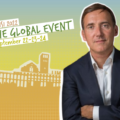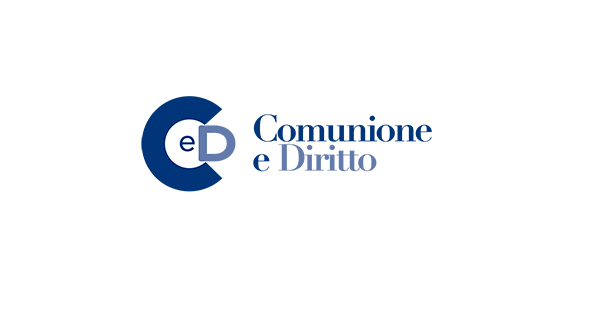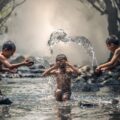
Watch
Vandana Shiva: the mantra for the future is Saint Francis’ statement: “It is only in giving that you receive”
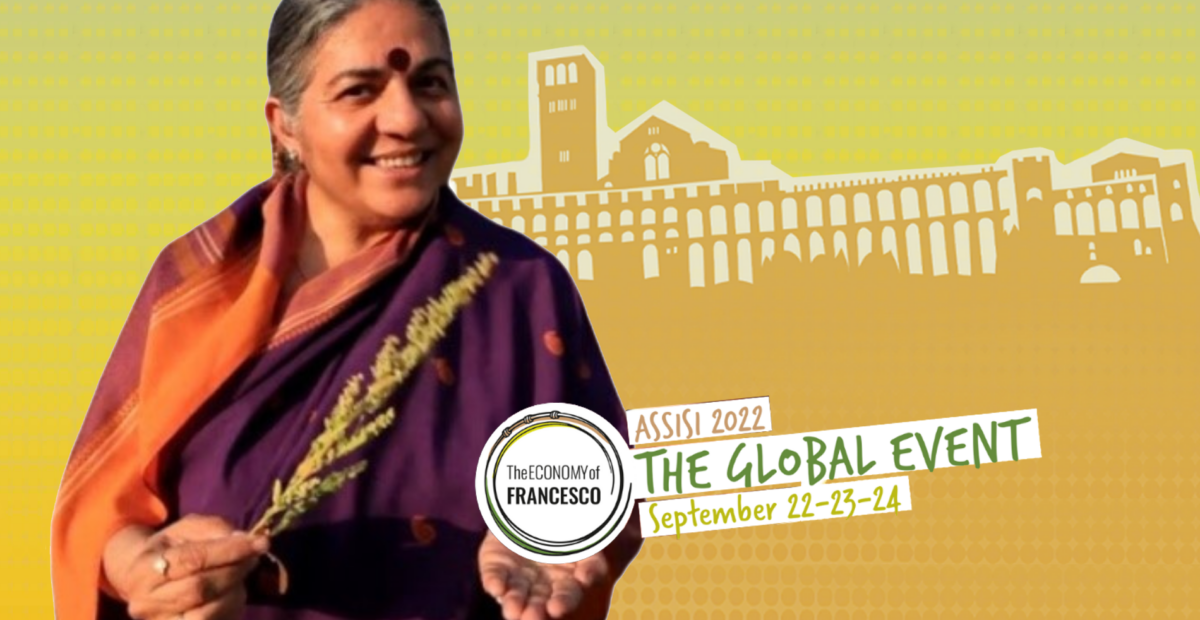
Vandana Shiva is a Scholar and environmental activist, a Member of the International Forum on Globalization (India) and a member of the International Organization for a Participatory Society. She will join us for the next EoF global event, and as we journey toward Assisi, we wanted to interview her, in order to deepen some important topics. So, let us talk about ecology, economy, and environment with Vandana Shiva.
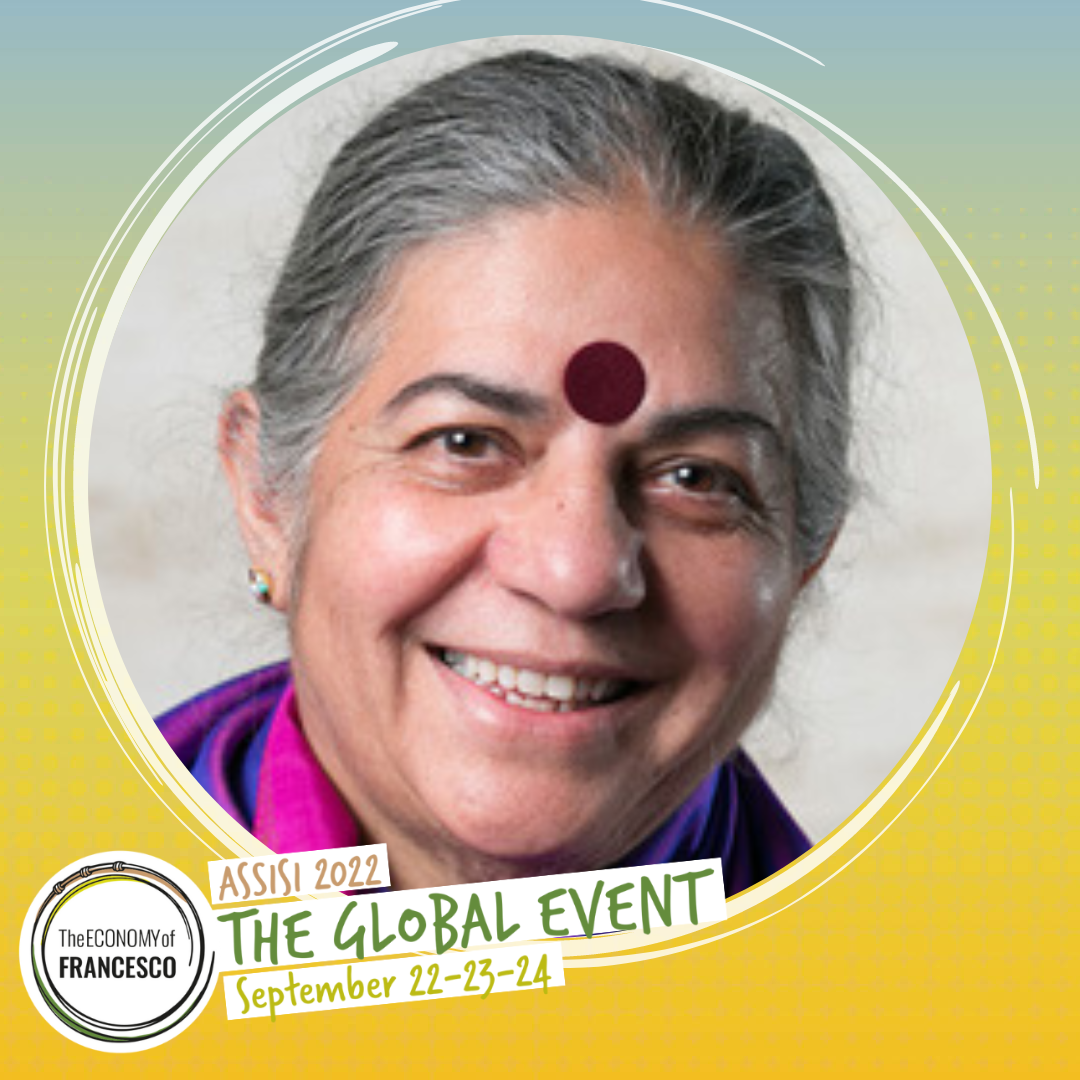
In the midst of the ecological crisis, and the crisis of social and economic inequality, how do you see The Economy of Francesco movement and what role can it play?
First of all, I do not see the ecological crisis as different from the social and ecological crisis. They are just two faces of the same crisis; it depends on which part you look at. When you look at it from what is happening to the Earth, you see the ecological crisis, but when you see it from the perspective of people who are on the Earth, you see the social and economic crises. But unless you see the two together you will never ever find the real way out of these crises. The same patterns repeated cause the crises.
The first pattern is money-making. Money-making is not the true economy; money-making is one element of some people’s activities. Most people do whatever they do not for money and not because of money but for higher reasons. Money might be a medium, to pay a salary for example, but the work is of a higher order. What is being called economy today? It is the art of money-making by a few billionaires who now control 40% of the wealth of the world in the name of wealth creation.
How do San Francisco teachings correct this error, stop the threat, and create a new economy? First, by helping us realize, aware that we are part of the Earth, that other beings are brothers and sisters, and to see not only the economic crisis but also the social and deep economic inequality. This is because the gifts of the Earth have been appropriated. Four corporations want to control the seas, corporations want to control the food! That is not right for the Earth and is not right for the people. When we realize that the Earth is our family, – and this is a teaching of Saint Francis – we realize that we cannot own it! What connects family is giving love, so instead of maximizing the currency, instead of making money, when you see the Earth as a family you maximize love! Making money is an extraction, taking care is giving!
And that is why for me the most important “mantra” as we call it in India, most important mantra for the future is Saint Francis simple statement: “It is only in giving that you receive.”
This year’s EoF School was dedicated specifically to plants and what they have to teach us, for a paradigm shift: because just as plants are anchored to the earth, we too are closely linked to this planet; we do not have a planet B. We are aware of the knowledge and passion that you have for forests. What do you think forests can teach us in order to have a better economy?
Plants and forests have to be the teachers of the future. They have been my teachers since the ’70s. Plants teach us: It is in giving that you receive. But there are other systems that plants teach us. All the infrastructure that we have been building is an escape from where we belong! Mobility has been seen as a virtue for which communities must be sacrificed.
Plants teach us three things that are so important for our future. They teach us about belonging, being rooted, having roots that humanity needs to reclaim, the right to rootedness and belonging. The second thing that plants teach us is symbiosis. You give to the soil and then the soil fruits come up! Plants teach us an economy of mutuality and symbiosis! And the third thing that plants give us is abundance. One carrot (one seed) gave us five thousand carrots. One tomato gave us 1500. That is the level of abundance that plants give: a small seed that keeps growing and feeding all life. That kind of economy of abundance – Plants give us in abundance – in the stationary system of state, which is not static, which is hugely dynamic, and evolutionary.
What role can women play in this economic transition, in this change in which we are protagonists?
You know, I never proposed ecofeminism, I just understood that a big lie was told to us. That nature is dead, and women are passive. When Nature has created all the resources in the Earth, and women are the most important producers, taking care of food, water, and the sick. And this is the economy of care. It is not that women will play a new role, just like plants have been teachers in this transition, women have to be the teachers in the transition from greed to care. Centring the economy of care is where the role of women’s leadership becomes very vital. Industrialism created one-dimensional people, and we have to open up into multidimensional people.
Greed created “what can I take, what can I grab, how much can I get from what.” Women have shown us that taking care of others is important. We all have to be mothers with all life on Earth, and mothering is the activity of caring.
Care is the most creative act, and the most valuable creation, because it is creating value in life.
In the Economy of Francesco, we believe that the economy must move from self-interest (greed) to self-love and love for others. However, this is not always easy in a capitalist world. In your experience, what could be the practical ways to achieve this goal?
I think that first of all, the economy of greed is based on a dead nature. But all the new sciences are sciences of life and generativity. So, the first thing is that we need to move from a death paradigm to a living Earth, to being part of a living Earth.
The second is the measures we use to make something look scientific. So basically, all of these measures of extraction are creating the living system that sustains life into a dead commodity that generates profit. But this is going to the next level with the new financialization of nature, that all nature should be owned. But if they own it, then the others cannot have access to it and that would mean a new level of dispossession. So, what we have been taught as measures, are measures of extraction. Well-being is how healthy you are, how many times can you smile happily, how relaxed your children are … Those are truly clear indicators of living. We need to start measuring in new ways because you see in new ways. So first: Earth is living. Second: the measurement of extractivism is not a measure of life.
Would you like to leave a message for the young people who are preparing for the meeting in Assisi?
Celebrate your life on a generous living planet! Do not get overwhelmed by the hum that greed has caused. Start thinking of the creative world you can engage, the creative work for the Earth, for the larger community. Earth care, community care, and your care are the same care. Care is indivisible, abundance is indivisible, and that is the world of creating a new economy of abundance, where there is no one unemployed because the Earth is creating work for you! and that is the world of wellbeing we must jointly create.
July 1st, 2022| EoF PEOPLE, EoF PEOPLE, HUBs, Life and Lifestyle, Main Stage, News, Villages, WHAT’S ON, WHAT’S ON
Share This!
